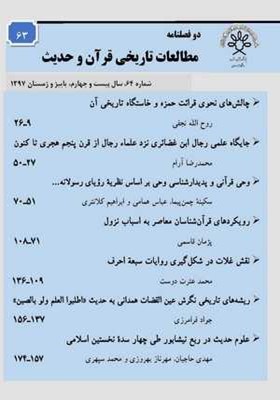رویکردهای قرآنشناسان معاصر به اسباب نزول
محورهای موضوعی : تاریخ علوم قرآن
1 - دانشآموختۀ کارشناسی ارشد علوم قرآن و حدیث، دانشگاه شهید چمران، اهواز، ایران.
کلید واژه: بررسی و نقد, اسباب نزول, رویکرد کلاسیک و سنتگرا, رویکرد جدید و نقادانه, تحوّلات, علل و مبانی,
چکیده مقاله :
دانش اسباب نزول از کهنترین مباحث علوم قرآنی و مرتبط با فهم قرآن است. در دورۀ معاصر علیرغم تداوم آرای گذشتگان نزد قرآنشناسان کلاسیک، در قریب به تمام مباحث این علم تغییر و تحوّلاتی مشاهده میشود. مطالعۀ حاضر با روشتوصیفی ـ تحلیلی به بررسی رویکردهای قرآنشناسان و تحوّل دیدگاههای آنها در این حوزه میپردازد. بررسی انجامشده نشان میدهد که تداوم دیدگاه گذشتگان در دورۀ معاصر نتیجۀ عواملی همچون گرایش به تفسیر بر پایۀ روایات و احیاناً گرایش به تقلید از شیوۀ تفسیری گذشتگان است. تغییر و تحوّلات مذکور نیز عمدتاً برخاسته از تحوّل دیدگاهها در باب ماهیت متن قرآنی، میزان تعامل متن قرآنی با واقعیت، رویکرد نقادانه نسبت به روایات، اعتقاد به ضرورت بازنگری دقیق دیدگاههای گذشتگان و بررسی همهجانبه میراث دینی است. به نظر میرسد که دوران معاصر، عصر توسعۀ بحثها دربارۀ سبب نزول بوده، و شکلگیری دیدگاههای متعدد را در پی داشته است؛ خواه دیدگاههایی مانند بینیازی تفسیر از اسباب نزول، و عدم ضرورت وقوع سبب و نزول آیه در تعریف سبب نزول که از دید غالب مفسرانْ معتبر به شمار نیامدهاند و در این مطالعه بهتفصیل نقدهایشان هم ذکر خواهد شد، و خواه دیدگاههای متعدد دیگری که مقبول مفسران مسلمان افتادهاند.
The science of Occasions of Revelation is one of the oldest issues discussed in Quranic sciences and id related to the understanding of the Qur'an. In the contemporary era, despite the persistence of the views of the classical Qur'anic scholars, almost all the disciplines of this science have undergone changes. The present study, with a descriptive-analytical approach, examines the approaches of the Qur'anic scholars and the evolution of their views in this field. The present study shows that the continuity of the views of the past in the contemporary period is the result of factors such as the tendency to interpret based on narratives and, moreover, the tendency to imitate the interpretive style of the past. These changes are mainly due to the evolution of views on the nature of the Qur'anic text, the extent to which the Qur'anic text interacts with reality, a critical approach to the traditions, the belief in the need for a rigorous rethinking of the views of the past, and a comprehensive examination of religious heritage. Contemporary times appear to have been the era of debates about the causes of revelation, and have led to many views, whether views such as the independence of interpretation with regard to the causes and that it is not necessary for the definition of occasion of revelation to include the cause of revelation, the point that has been approved by most commentators. This study will detail the critiques of such commentators, as well as numerous other views that have been accepted by Muslim commentators.
_||_


